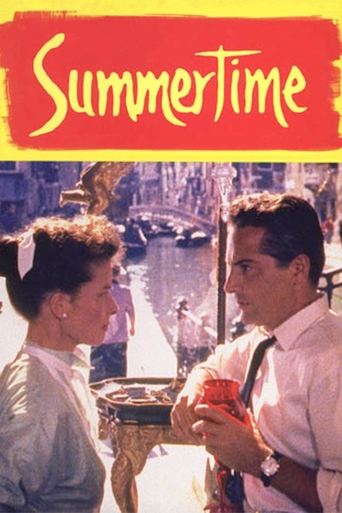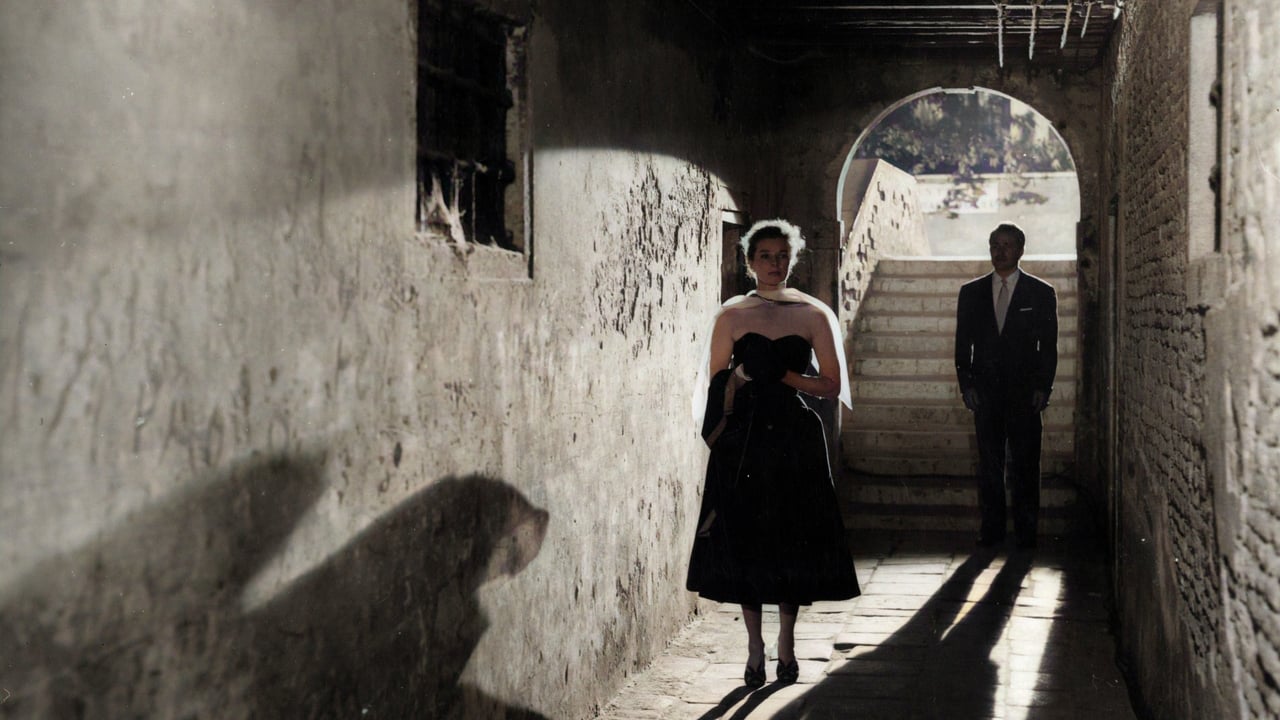Kauf Buch
No...simply NO! Do you enjoy campy films with near-zero story line? Experiencing the anguish of neurotic women who have no self-esteem...or the lying, cheating, thieving men who abuse them? Then: this film is for YOU! On a positive note, Venice is pretty and you get to see Piazza San Marco about 1,000,000 times.
Steve Pulaski
To call Katharine Hepburn's Jane Hudson character in David Lean's acclaimed Summertime a sheltered woman doesn't even begin to scratch the surface of her character; calling her prudish or writing her off as shy doesn't truly summarize her well either. In the best terms I can conjure, Jane is somebody who silently craves human affection and companionship but is afraid to receive it and doesn't truly know how to reciprocate it. It reminds me of how many of my friends describe depression, as a force that basically condemns and belittles you for having know friends, yet the same mind able to create these kinds of thoughts is incapable of allowing you to remedy them in a social sense.Is Jane depressed? I don't think so. I think she's doing her best to believe she's content with being a secretary in an elementary school, a job that allows for little communication outside the realm of business. As a result, she has saved up enough money to finally take a vacation in Venice to hopefully break the monotony of her life and receive inspiration. Right off the bat, we can see Jane has done her homework on Venice and hasn't impulsively decided to take out three or four figures out of her bank account to fund a trip to a place she knows nothing about. She encounters a couple who has probably done a similar act of impulsion and rights many of the wrongs they make in judging the land and its customs before her ferry even arrives.Once there, Jane indulges in all the luxurious cafes and attractions by herself. This wouldn't be such a glaring issue if, for one, Jane looked happy whilst treating herself, or Lean's camera didn't intimately focus on the other tourists and couples indulging in the company of one another. Jane is an outsider in more ways than one here, being that she has no one to share her experiences with, and no one to come home to at night. One evening, while sitting in a cafe, Jane becomes uncomfortable with the presence of an Italian man and promptly leaves shortly after arriving.She later meets the same man, Renato de Rossi (Rossano Brazzi), at an antique shop in Venice, which he just so happens to own. The two wind up spending time together, as he shows her some of the most prized possessions in his shop. In the meantime, Jane also begins hanging out with a young boy, who often instigates or provokes her because of her lack of extroversion in social situations. The boy also serves as one of the defining forces of comic relief in the film. One particular moment where he shines involves Jane walking backwards whilst holding her camera, which she keeps close to her throughout the entire course of the film, in order to get the best shot of a landmark. As she's walking, Jane is oblivious to the river behind her, but just before she takes one step over the edge, the little boy grabs the camera right out of her hand, making no effort to save her or prevent her from falling.Summertime is one of those films that has an underlying sadness that quietly sneaks up on you as you're watching it. It's hard to notice at first, with Lean and cinematographer Jack Hildyard's sunny cinematography bleeding through the frame every chance it gets. This is one of the few films I know of that bears a disposition almost entirely built upon natural lighting, particularly in the indoor sequences, which still has a copious amount of sunshine coming through windows. Nonetheless, this device works almost as a contrast to the idea of Summertime, which is Jane's refusal to indulge in any kind of romance or happiness.It's not that Jane is happier alone - far too many times do we see her eating alone or doing some other typical social activity by herself where she looks incomplete. It's that she doesn't know how to build up a social relationship, nor does she seem to want to allow herself to get close to anyone she meets. Consider Renato, a well-meaning man who clearly sees Jane for who she is, a lonely and romantically repressed woman by her own volition rather than by circumstance. With that, Hepburn plays the character of Jane, a tricky role to put it lightly, in a superb manner. She always puts Jane's mannerisms before her own personal acting mannerisms, emphasizing Jane's very precise and specific movements that ultimately attempt to result in some sort of pleasure for herself. It's a role that is equally reliant on personal movements and patterns as it is on layered character development, and Hepburn nails both in the way she handles the role.Summertime is one of the brightest films about sadness I've yet to see; a seriously sad but ultimately charming film that works to detail the kind of alienation a person faces because of nobody other than themselves. Anchored by a fabulous performance by Hepburn and commendable cinematography, this is the kind of film that really replicates loneliness in that you can't shake it as much as you can simply recognize that something is wrong.Starring: Katharine Hepburn and Rossano Brazzi. Directed by: David Lean.
jarrodmcdonald-1
To really appreciate Summertime you have to do a bit of cinematic homework. First, you need to see Katharine Hepburn's earlier romantic melodrama Alice Adams because it is referenced quite a bit in this film (the business with the flower and a Midwestern woman pining for a grand life). And then, considering director David Lean, you need to have seen Brief Encounter, which came ten years before this film. The ending is essentially the same, with a farewell along a train platform and the consequences of an extra-marital affair. Once you've seen these other titles, then you can really understand how Hepburn and Lean's careers combine at this juncture to make a unique film. The characters are not exactly likable in this story. There are young boys that smoke and sell things they should not be selling; an older over-ripe American woman who succumbs to a shop owner's lustful desires; and other tourists who seem to be negative and selfish, etc. But what makes Summertime interesting is that it provides a romantic look at a very unromantic situation, and it uses the splendor of a Venetian locale to do it.
maryszd
In this wonderfully dated film, Prudence Bell (Suzanne Pleshette) and Don Porter (Troy Donahue) are romantically involved young Americans in Rome. Prudence is a wisely named and intelligent young woman who in a way, presages the sexual revolution and women's movement that came later in the decade. She's a teacher who left her job after she was reprimanded for giving a student a romance novel. As a schoolteacher traveling alone to Rome, she's a far cry from the lonely spinster Katherine Hepburn played in Summertime (although Rossano Brazzi shows up again in this film) just seven years earlier. But Prudence is still holding out with Don until he commits himself to marrying her. Her opposite, Angie Dickinson, plays Lyda Kent, Don's ex-girlfriend who unlike Prudence, is sexually active and a rival for Don's affections. The adventure of Rome Adventure is really the adventure of young women and their sexuality. The film also is more of a travelogue about Rome and Italy than we would see in films today. These were the days before the advance of mass tourism and Americans didn't take trips to Europe for granted. The sights Prudence and Don see are astonishingly uncrowded by today's standards. Pleshette and Donahue are solidly unpretentious actors who were easy for their young audience to identify with. A charming period piece of a film.


 AD
AD




